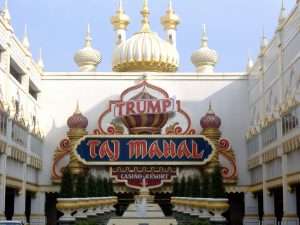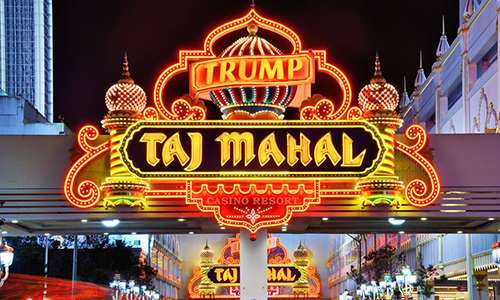Trump Taj Mahal Is Now Just a Big, Ugly Building
America’s scariest jack-o’-lantern Donald Trump may be going down in a blaze of hate and creepiness this election season, but his Atlantic City namesake casino, the Trump Taj Mahal, certainly went out with a whimper. The gaudy Boardwalk gambling venue, which Trump once called the “Eighth Wonder of the World,” closed on Monday after months of labor strife.
The Taj had an inauspicious start. Construction was begun in 1983 by Resorts International. After Resorts’ founder died, Trump bought a controlling stake in the company for $79 in 1987. Trump immediately over-extended himself, taking the construction budget from $250 million to $930. Resorts needed to raise $550 million in financing for the project, and when he had trouble finding takers, Trump himself offered to buy up the rest of the company for $22 per share. Merv Griffin, though, offered $35 per share and the two engaged in legal fisticuffs. They settled in 1988; Griffin got the company and Trump got the casino.
In an excellent article about how Donald Trump basically destroyed his Atlantic City casinos while still making a ton of money from them, The New York Times explained that the New Jersey Casino Control Commission expressed concern that the Taj would fail because of the skyrocketing costs. Said The Times:
Mr. Trump told the commission in 1988 that he could rein in expenses, because conventional lenders were lining up to give him money at low interest rates. He said he abhorred junk bonds, which were then popular, because they carried a bigger risk of default and thus came with higher interest rates.
Within months, he reversed course, issuing $675 million worth of junk bonds, with a 14 percent interest rate, to finish construction and get the Taj open. In recent interviews, Mr. Trump has said that with each financing he routinely took money out of the casinos to invest in Manhattan real estate. Total debt on the Taj exceeded $820 million.
The casino opened in 1990 and went into bankruptcy in 1991. Trump gave up half the casino to bondholders in exchange for lower interest rates on his debt. Many vendors and contractors were paid just fractions of what they were owed from the construction. The Taj Mahal was sold to Trump Hotels & Casino Resorts in 1996.

Trump Taj Mahal
Revenue-wise, the Trump Taj Mahal was the Atlantic City champ until the Borgata opened in 2003. From there, it was mostly downhill as the Borgata and other casinos in neighboring states siphoned off the Taj’s customers.
Fast forward to late 2014, when Trump Entertainment Resorts (a later name of the original company) entered bankruptcy. Obviously, the company was having financial problems and had been, essentially, for its entire existence, but as part of the bankruptcy proceedings, the Taj Mahal’s workers had their health and pension benefits taken away. Carl Icahn took over control of Trump Entertainment Resorts in February 2016 when the company emerged from bankruptcy, having pledged to inject $100 into the Taj to help keep it running if he received certain concessions from the Unite Here Local 54 union and $175 million in tax breaks. He got the concessions but not the tax breaks and eventually refused to invest the $100 million because of possible plans to amend the gambling law to allow casinos outside of Atlantic City.
After negotiations with Icahn and Tropicana Entertainment, the operator of the Taj, failed, the Unite Here Local 54 workers – more than 1,000 of them – went on strike in early July. At the beginning of August, Tony Rodio, President and Chief Executive Officer of Tropicana Entertainment, announced that the Trump Taj Mahal would close. The closure was originally slated for after Labor Day, but got pushed to October 10th.
Rodio said, “Currently the Taj is losing multi-millions a month, and now with this strike we see no path to profitability. Unfortunately, we’ve reached the point where we have will to have to close the Taj after Labor Day weekend and intend to send WARN (Worker Adjustment and Retraining Notification) notices to before this weekend.”
Bob McDevitt, President of Unite Here Local 54, called bullshit, saying:
How petty. I would never have thought Carl Icahn was so one-dimensional. The great deal-maker would rather burn the Trump Taj Mahal down just so he can control the ashes. For a few million bucks he could have had labor peace and a content workforce, but instead he’d rather slam the door shut on these long-term workers just to punish them and attempt to break their strike. There was no element of trying to reach an agreement here on Icahn’s part; it was always “my way or the highway” from the beginning with Icahn. It is the epitome of the playground bully, who picks up his ball and announces he is going home because nobody else would do it his way. It is truly a shame that such an unscrupulous person has control of billions of dollars.
And so we reached October 10th without any deals and the Trump Taj Mahal is closed. It is the fifth Atlantic City casino to shut its doors since 2014. The carnage began in January of that year when the Atlantic Club closed. Later that year, the other three went down within weeks of each other. The Showboat closed in late August, Revel in early September, then the Trump Plaza in mid-September. Before 2014, there were a dozen casinos in Atlantic City; there are now seven.

















COMMENTS